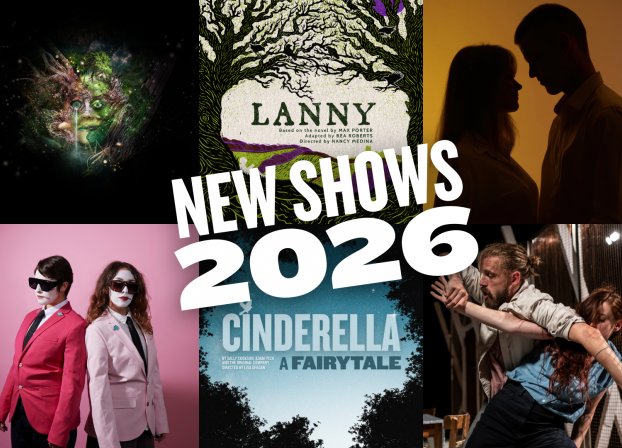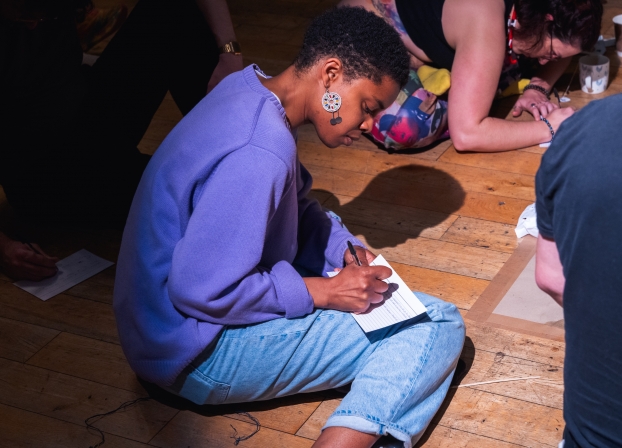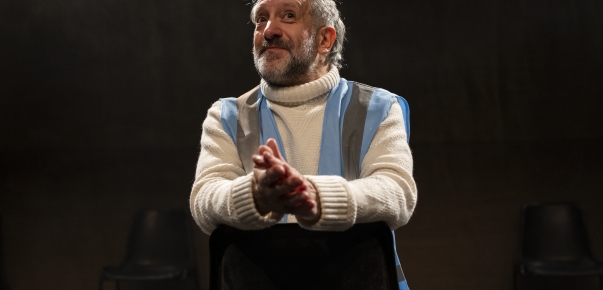Artists Town Hall | a discussion
5 Aug 2024
We hosted our first Artist Town Hall in July with nearly 60 artists packing a hot Cooper’s Hall.
Artistic Director, Nancy Medina, Literary Manager Ben Atterbury, and Literary & Directors’ Associate Lisa Gregan updated on all aspects of Bristol Old Vic’s Artist Support activity.
This included more details on the plan to recruit three writers to our 5 Year Commitment, the Early Career Writing Programme, plus refreshed information about how we programme the stages, and how to contact us.
The floor was opened at the end for a Q&A and here’s a digest of the questions that artists raised in the room.
How will you define ‘years of experience’ when thinking about the 5 Year Commitment and other programmes and defining what you ‘need’ to qualify as an Early or Mid-Career writer?
We don’t want to put false parameters on this. Our interest is in people that can demonstrate a commitment to and an engagement with writing over a period, rather than needing to have already had, say, five plays produced.
There is no age stipulation or limits either. We know that writers can emerge at all stages of life.
Social change and social mobility are high up our priorities so it’s important that we say that if you define yourself as a writer and can show your commitment to writing, you’re likely to be eligible to apply.

What is the offer for Directors?
Lisa Gregan, previously Bristol Old Vic’s Young Company Director, has moved into a new position in the Literary Team as Literary and Directing Associate to hold and develop our offer for directors. The first thing we’ve done is create the role of Trainee Young Company Director that will make work with young people and be mentored by Nancy, Lisa and the team. Part of Lisa’s role is to think about how we can best support directors in the region; she will look after opportunities to work as an assistant or associate on BOV productions as well as our JMK directors network. Work to support directors is a vital part of our future artist support offer, but it’s going to take some time for this to evolve and take share.

How do you define the South West region?
We work with artists and companies from across the South West region, which in terms of Arts Council England catchment, is large! From Lands End in Cornwall up the coast to Southampton, across to Gloucester and back. But as Bristol Old Vic is based physically here in Bristol I think it’s important to say we will always be connecting with a high proportion of artists based in close proximity to the theatre, as they can make regular use of our bricks and mortar space. Some of our programmes will remain exclusively eligible for artists and companies based in or from the South West and some programmes we’ll be looking to hear from people anywhere in the UK.
How are you going to contract commissions from writers and handle intellectual property of the work if it doesn’t make it to production?
All our commissions, including those made through the 5 Year Commitment will go through our standard contracting processes & be guided by our agreements with the Writers Guild of Great Britain. That outlines the agreement with the writer about drafting, timeline and delivery dates. Once the agreement has been concluded, the rights always return to the writer.

What work do you want to commission - what are you looking for?
We need to match our ambition to the reality of the current context the creative sector is operating in so that we can deliver what we commit to doing and making. We don’t want to over promise. The costs of producing work have risen massively in the last few years and income & subsidy haven’t kept pace. The hard truth is that this means we can’t produce as much as we might have been able to do in the past right now & so we have to make careful decisions about how to invest our resources.
We’re always looking at the balance of our programme and how it delivers for the audiences we have and the new audiences we also want to welcome through the doors. So we’re interested in stories that support positive societal change, that help nuanced political debate, that provide a great night out.
If you look at the programme as a whole across the Theatre and Studio, our stages are platforming a lot of new stories, underrepresented stories, and attracting an encouraging mix of existing and new audiences. You might want to take a look at the new information on our website for more information about the things we think about when we’re assessing the approaches we get – we've tried to be as transparent as we can be about that.
To acknowledge the elephant in the room, we do often interrogate whether new productions have potential for commercial success beyond Bristol. Commercial success for one production today really does help us invest in something else in the future.
We’ve seen some success here in the last year with new British musicals and we know Bristol audiences are fantastically supportive of new work, so we’re keen both those things continue to feature strongly in future programmes in the Theatre and Studio.

How do we support artistic community and collaboration in the absence of organisations like Theatre Bristol?
Collaboration is a really important aspect of what we do ‘behind the scenes’, with creatives and venues and co-producing partners in Bristol and across the UK.
We’ve maintained our work with young people and our arts education activity to help develop a love and appreciation of the arts in the face of declining cultural provision in state education.
Bristol Old Vic has a presence on Bristol’s Culture Board and we support city-wide conversations about the strategic direction of culture in the city. It’s the responsibility of the sector to help better join-up the dots across Bristol and help identify the gaps. We know the loss of organisations leaves a gap and they are missed in terms of the capacity and connectivity of artist support they provided. It will take time and more support to replace this capacity.





